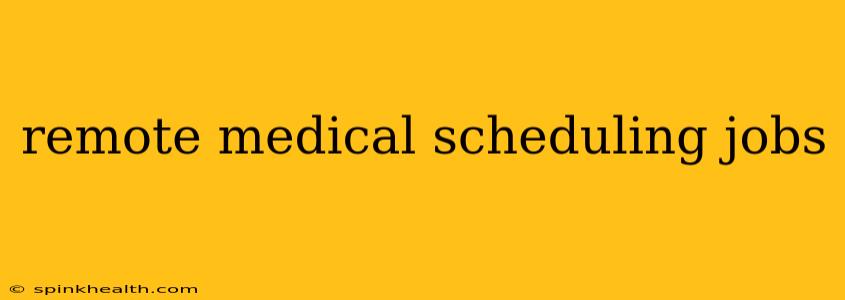Remote Medical Scheduling Jobs: Your Guide to a Flexible Career in Healthcare
The world of work is changing, and healthcare is no exception. More and more medical professionals are embracing remote work, creating exciting opportunities for those seeking flexible careers. If you're organized, detail-oriented, and passionate about healthcare, a remote medical scheduling job might be the perfect fit. Let's delve into this growing field and explore what it takes to thrive.
My name is Sarah, and I've spent the last decade working in medical administration, including five years managing remote scheduling teams. I've seen firsthand the incredible benefits—and the occasional challenges—of this career path. This guide is based on my experience and aims to answer the burning questions you might have about remote medical scheduling jobs.
What are the day-to-day tasks of a remote medical scheduler?
A typical day for a remote medical scheduler is filled with a variety of tasks, all designed to ensure patients receive timely and efficient care. This includes:
- Scheduling appointments: This involves managing patient requests, coordinating with physicians' schedules, and ensuring appointment slots are optimized for efficiency. You'll be using various scheduling software, often integrated with electronic health records (EHR) systems.
- Managing patient information: This means meticulously updating patient records, verifying insurance information, and handling any changes to appointments or patient details. Accuracy is paramount here.
- Answering phone calls and emails: You'll be the first point of contact for many patients, answering their questions, addressing concerns, and providing clear and concise information.
- Handling insurance verification and pre-authorization: Navigating insurance complexities is a crucial aspect of the job, ensuring that patients’ appointments are covered and avoiding billing issues.
- Communicating with providers and staff: Maintaining clear communication with doctors, nurses, and other medical staff is essential for seamless scheduling and efficient workflow.
What skills are needed for a remote medical scheduling job?
Beyond excellent communication skills, success in this role requires a blend of technical and interpersonal abilities:
- Strong organizational skills: You'll be managing multiple schedules and patient records simultaneously, so impeccable organization is crucial.
- Proficiency in medical terminology: A solid understanding of medical terminology will make communication with providers and patients smoother.
- Computer skills: You'll be working extensively with scheduling software and EHR systems, so computer proficiency is essential.
- Exceptional communication skills: This includes both written and verbal communication, as you'll be interacting with patients, doctors, and colleagues throughout the day.
- Problem-solving abilities: You'll encounter unexpected scheduling conflicts and patient issues, so strong problem-solving skills are a must.
What type of software is used in remote medical scheduling?
The specific software used can vary depending on the healthcare provider, but common platforms include:
- Scheduling software: Examples include Kareo, Practice Fusion, and SimplePractice. These systems allow for online appointment booking, calendar management, and patient communication.
- Electronic Health Record (EHR) systems: Epic, Cerner, and Athenahealth are some of the major players in this space, often integrated with scheduling software.
Familiarity with these or similar systems will significantly enhance your job prospects.
How much do remote medical scheduling jobs pay?
The salary for remote medical scheduling jobs can vary based on location, experience, and the size of the healthcare practice. However, you can generally expect a competitive salary commensurate with your skills and responsibilities. Researching average salaries in your region is highly recommended.
What are the benefits of a remote medical scheduling job?
Beyond the competitive salary, remote medical scheduling jobs offer a host of benefits:
- Flexibility: The ability to work from anywhere with a reliable internet connection offers unparalleled flexibility in managing your work-life balance.
- Work-life balance: Remote work allows for greater control over your schedule, reducing the stress associated with commuting and rigid office hours.
- Career growth: With experience, you can advance to supervisory roles or explore other areas within medical administration.
How can I find remote medical scheduling jobs?
Job boards like Indeed, LinkedIn, and ZipRecruiter are excellent starting points. Additionally, searching directly on the websites of healthcare practices and hospitals can uncover hidden gems. Networking within your professional circle can also yield fruitful results. Remember to tailor your resume and cover letter to highlight your relevant skills and experience.
Embarking on a career in remote medical scheduling offers a blend of professional fulfillment and personal flexibility. With the right skills and dedication, you can build a successful and rewarding career in this ever-growing field. Good luck on your job hunt!

